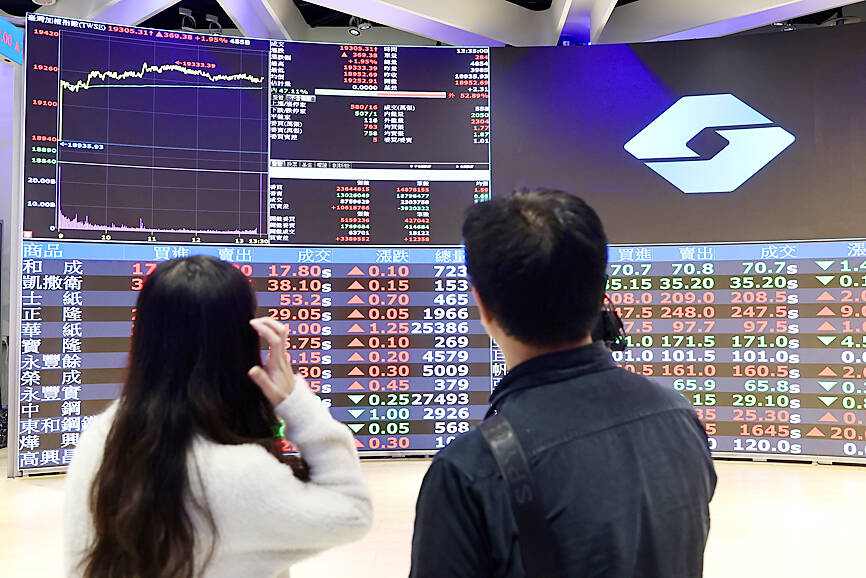Taiwan Semiconductor Manufacturing Co (TSMC, 台積電) stock yesterday rose to its highest-ever level, tracking a global rally in chip stocks fueled by optimism about artificial intelligence (AI) and helping the TAIEX add nearly 2 percent.
The world’s top chip foundry increased 5.22 percent to close at NT$725 in Taipei trading, a record since its stock listing in 1994. The surge lifted its market capitalization to US$597 billion, one step closer to reclaiming a spot in the world’s 10 most valuable companies.
TSMC has soared more than 22 percent so far this year, helping the local benchmark TAIEX also reach a record high, ending up 1.95 percent at 19,305.31 yesterday, Taiwan Stock Exchange (TWSE) data showed.

Photo: CNA
Turnover on the main board totaled NT$485.383 billion (US$15.39 billion), the second-largest since Feb. 15, when turnover was NT$492.695 billion, while three major institutional investors were net buyers of Taiwanese equities, purchasing a net NT$44.48 billion in local stocks yesterday, TWSE data showed.
The gains in Taipei followed a strong Wall Street performance on Friday, with the S&P 500 and the tech-rich NASDAQ ending at all-time highs off continued momentum for AI-linked equities, especially Nvidia Corp, which finished with a valuation above US$2 trillion for the first time.
TSMC, the main supplier to Nvidia and Apple Inc, is considered a key beneficiary of the ongoing AI boom, with its executives expecting a return to solid growth this quarter amid signs of a demand recovery. Nvidia’s upbeat results last month further cemented investor optimism about the sector.
Separately, Japan’s benchmark Nikkei 225 index yesterday surpassed 40,000 points for the first time, with analysts predicting it could advance even further, lifted by Wall Street rallies, robust corporate earnings and optimism over AI.
Shares in Japan have also been boosted by continued easy credit policies, with the Bank of Japan pumping money into the economy to help support growth.
The Nikkei 225 index rose as high as 40,314.64, but fell back slightly. It gained 0.5 percent to close at 40,109.23, having risen for five weeks straight.
Tech darling Tokyo Electron Ltd rose 2.4 percent yesterday and has surged over 50 percent since the start of the year.
Elsewhere in Asia, Hong Kong finished flat yesterday and Shanghai closed higher ahead of the start of China’s annual legislative conclave.
At the rubber-stamp parliamentary meeting, leaders are expected to set an annual growth goal of about 5 percent for this year, SPI Asset Management managing partner Stephen Innes said.
Seoul, Mumbai, Manila and Kuala Lumpur were also up, while Sydney, Wellington, Jakarta and Singapore were down.
The solid performance of global markets provides “favorable trade winds for Asian markets as the new week begins,” Innes said.
Hope for US interest rate cuts, indications of cooling inflation and a soaring passion for AI within the tech sector have driven investor sentiment, he said.
“These factors collectively contribute to the positive tone in global markets, which is expected to bolster Asian markets,” Innes added.

TECH SECURITY: The deal assures that ‘some of the most sought-after technology on the planet’ returns to the US, US Secretary of Commerce Gina Raimondo said The administration of US President Joe Biden finalized its CHIPS Act incentive awards for Taiwan Semiconductor Manufacturing Co (TSMC, 台積電), marking a major milestone for a program meant to bring semiconductor production back to US soil. TSMC would get US$6.6 billion in grants as part of the contract, the US Department of Commerce said in a statement yesterday. Though the amount was disclosed earlier this year as part of a preliminary agreement, the deal is now legally binding — making it the first major CHIPS Act award to reach this stage. The chipmaker, which is also taking up to US$5 billion

CHANGING JAPAN: Nvidia-powered AI services over cellular networks ‘will result in an artificial intelligence grid that runs across Japan,’ Nvidia’s Jensen Huang said Softbank Group Corp would be the first to build a supercomputer with chips using Nvidia Corp’s new Blackwell design, a demonstration of the Japanese company’s ambitions to catch up on artificial intelligence (AI). The group’s telecom unit, Softbank Corp, plans to build Japan’s most powerful AI supercomputer to support local services, it said. That computer would be based on Nvidia’s DGX B200 product, which combines computer processors with so-called AI accelerator chips. A follow-up effort will feature Grace Blackwell, a more advanced version, the company said. The announcement indicates that Softbank Group, which until early 2019 owned 4.9 percent of Nvidia, has secured a

TRADE WAR: Tariffs should also apply to any goods that pass through the new Beijing-funded port in Chancay, Peru, an adviser to US president-elect Donald Trump said A veteran adviser to US president-elect Donald Trump is proposing that the 60 percent tariffs that Trump vowed to impose on Chinese goods also apply to goods from any country that pass through a new port that Beijing has built in Peru. The duties should apply to goods from China or countries in South America that pass through the new deep-water port Chancay, a town 60km north of Lima, said Mauricio Claver-Carone, an adviser to the Trump transition team who served as senior director for the western hemisphere on the White House National Security Council in his first administration. “Any product going

CARBON REDUCTION: ‘As a global leader in semiconductor manufacturing, we recognize our mission in environmental protection,’ TSMC executive Y.P. Chyn said Taiwan Semiconductor Manufacturing Co (TSMC, 台積電), the world’s biggest contract chipmaker, yesterday launched its first zero-waste center in Taichung to repurpose major manufacturing waste, which translates into savings of NT$1.5 billion (US$46 million) in environmental costs a year. The environmental cost savings include a carbon reduction benefit of 40,000 tonnes, equivalent to the carbon offset of over 110 Daan Forest Parks, the chipmaker said. The Taichung Zero Waste Manufacturing Center is part of the chipmaker’s greater efforts to reach its net zero emissions goal in 2050, aligning with the UN’s 12th Sustainable Development Goal. The center could reduce TSMC’s outsourced waste processing